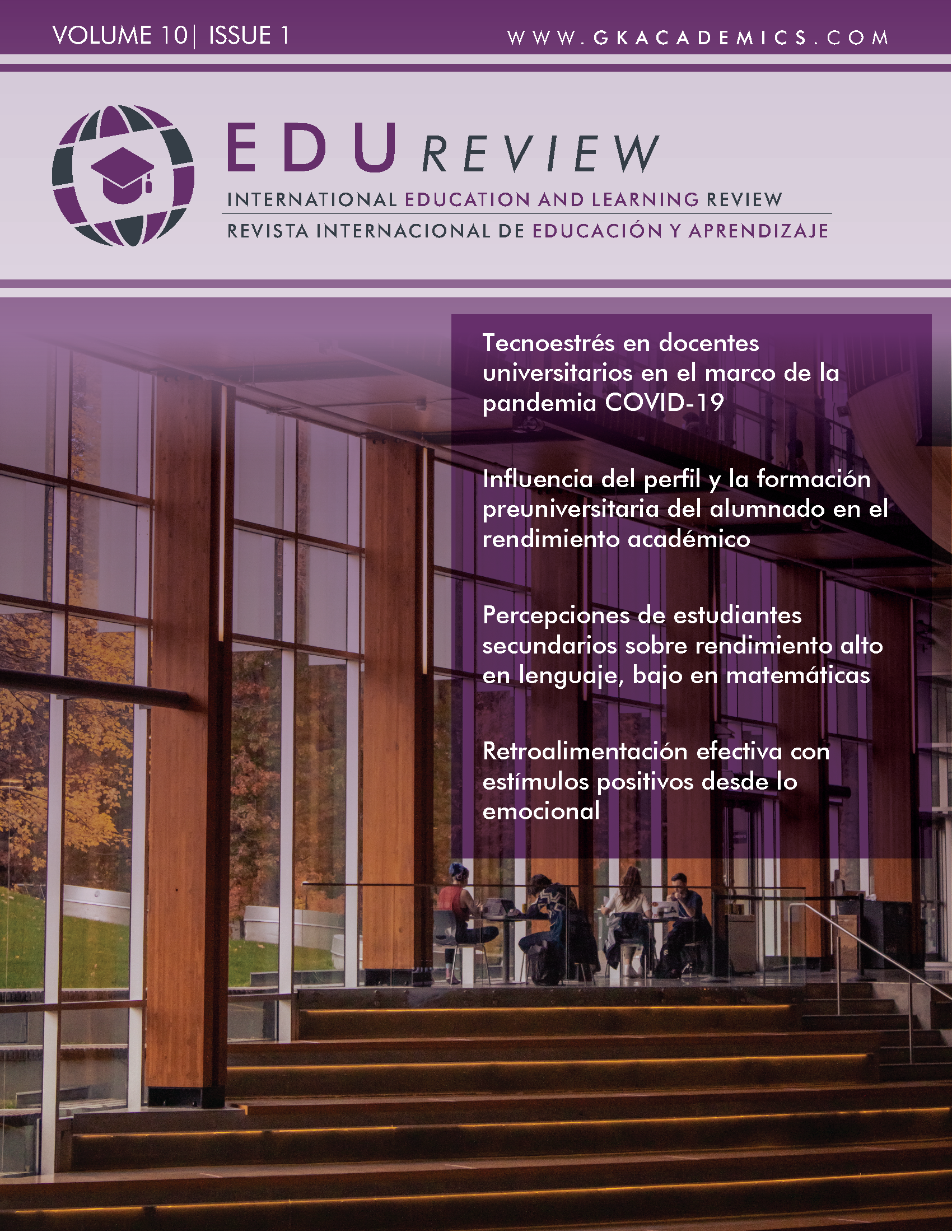Effective Feedback with Positive Emotional Stimuli
DOI:
https://doi.org/10.37467/gkarevedu.v10.3171Keywords:
Effective feedback, Positive reinforcement, Emotionalities, Self-esteem, Intrinsic motivationAbstract
It is described how the teachers of the Cadete Arturo Prat Chacón school (Chile), designed and implemented effective feedback in their classes, incorporating positive stimuli and thereby safeguarding the emotional health of their students. The study is based on an interpretive paradigm, with qualitative approaches, investigating and deepening the teaching action, and how they implemented strategies that mobilized positive reinforcements in their students, impacting their emotionalities. The results show that the positive reinforcements in group and individual form, impacted on emotionalities, self-esteem, self-confidence, chances of success and intrinsic motivation.
Downloads
Global Statistics ℹ️
|
2180
Views
|
1552
Downloads
|
|
3732
Total
|
|
References
Agencia de Calidad de la Educación. (2017). Los indicadores de desarrollo personal y social en los establecimientos educacionales, una primera mirada. Santiago de Chile. http://www.agenciaeducacion.cl/wpcontent/uploads/2016/02/Estudio_Indicadores_desarrollo_personal_social_en_establecimientos_chilenos.pdf.
Agencia de Calidad de la Educación (2021). Informe de Resultados del Establecimiento (Escuela Cadete Arturo Prat Chacón). Agencia de calidad.
Anojovich, R. (2019). Orientación para la formación docente y el trabajo en aula: Retroalimentación Formativa. SUMMA “LA Caixa Foundation” 1
Aprendizaje Emocional (s.f.). https://estilosdeaprendizaje.org/aprendizaje-emocional/.
Arias, E. Hincapié, D. y Paredes D. (2010). Educar para la vida El desarrollo de las habilidades socioemocionales y el rol de los docentes. Nota Técnica N° IDB-TN 908. Banco Interoamericano de Desarrollo. https://publications.iadb.org/publications/spanish/document/Educar-para-la-vida-El-desarrollo-de-las-habilidades-socioemocionales-y-el-rol-de-los-docentes.pdf
Benavidez, V. y Flores, R. (2019). La importancia de las emociones para la neurodidáctica. Wimblu, Rev. Estud. de Psicología, 14(1), 1659-2107. DOI: https://doi.org/10.15517/wl.v14i1.35935
Berger, C.; Milicic, N.; Alcalay, L.; Torretti, A. (2014). Programa para el Bienestar y Aprendizaje Socioemocional en estudiantes de tercero y cuarto grado: descripción y evaluación de impacto Revista Latinoamericana de Psicología, 46(3), 169-177. Fundación Universitaria Konrad Lorenz Bogotá, Colombia. https://www.redalyc.org/pdf/805/80533065004.pdf DOI: https://doi.org/10.1016/S0120-0534(14)70020-2
Berger, C., Álamos, P., Milicic, N. y Alcalay, L. (2014). Rendimiento académico y las dimensiones personal y contextual del aprendizaje socioemocional: Evidencias de su asociación en estudiantes chilenos. Universitas Psychologica, 13(2), 627-638. doi:10.11144/Javeriana. UPSY13-2.radp DOI: https://doi.org/10.11144/Javeriana.UPSY13-2.radp
Bisquerra, R. (2017). El Concepto de la educación emocional. Recuperado en: http://sentirypensar.aprenderapensar.net/2010/11/18/el-concepto-de-laeducacion-emocional/comment-page-1/
Buendía, M.A (2021). La importancia de la retroalimentación en el proceso de evaluación. CALAMEO. https://www.calameo.com
Blanco, C. (2014). Historia de la neurociencia. Siglo XXI.
Canabal, C. (2017). La Retroalimentación: La clave para una evaluación orientada al aprendizaje. Revista de Curriculum y formación de profesorado, 149-170. DOI: https://doi.org/10.30827/profesorado.v21i2.10329
Caso-Niebla, J. y Hernández-Guzmán, L. (2007). Variables que inciden en el rendimiento académico de adolescentes mexicanos. Revista Latinoamericana de Psicología, 39(3), 487-501.
Castillo, J. y Contreras, D. (2014). El papel del bienestar subjetivo para el desarrollo humano. Una revisión para el caso chileno. Santiago: Programa de las Naciones Unidas para el Desarrollo, PNUD. www.unicef.cl
Consuegra, N. (2010). Diccionario de Psicología. ECOE, 978-958. www.consuegrahotmail.com
Estrada, L. (2018). Motivación y Emoción. Fundación Universitaria de Área Andina. DOI: https://doi.org/10.33132/9789585539150
Fonseca, H. (2009). Retroalimentación durante el proceso de enseñanza aprendizaje: un arma de doble filo. Revista Salud Arte y Cuidado, 2(1), 50-52. https//www.imbiomed.com.mx
Garcia, A. (2019). Neurociencia de las Emociones: la sociedad vista desde el individuo. Una aproximación a la vinculación sociología -neurociencia. Sociológica, 34(96), 39-71. DOI: https://doi.org/10.24275/uam/azc/dcsh/sm/2019v34n96/Garcia
Glaser, B. y Strauss, A. (1967). The discovery of grounded theory: Strategies for qualitative research. Aldine Publishing Company. DOI: https://doi.org/10.1097/00006199-196807000-00014
Huberman A, Miles M (1994). Data management and analysismethods. In N., Denzin, & Y., Lincon (Eds.). Handbook of Qualitative Research. l Sage.
Ministerio de educación, República de Chile. MINEDUC (2017). Evaluación Formativa en el aula, Orientación para docentes: Integrando el uso pedagógico de la evaluación en la enseñanza. Unidad Curriculum y Evaluación, Ministerio de Educación. ISBN: 9789562926942.
Nicol, D (2010). From monologue to dialogue: Improving written feedback processes in mass higher education. Assessment & Evaluation in Higher Education, 35(5), 501-517. doi: 10.1080/02602931003786559 DOI: https://doi.org/10.1080/02602931003786559
O’Connor, E., & McCartney, K. (2007). Examining teacher–child relationships and achievement as part of an ecological model of development. American Educational Research Journal, 44(2), 340-369. DOI: https://doi.org/10.3102/0002831207302172
Reeve, J. (2010). Motivación y emoción (Vol. 5). McGraw-Hill
Roos, B. (2004). Lerarning and Asseeement in the Societe. Department of Education Umeå University, 1-21. http://citeseerx.ist.psu.edu/viewdoc/download?doi=10.1.1.200.7626&rep=rep1&type=pdf
Sandin, M.P. (2003). Investigación Cualitativa en Educación. Fundamentos y Tradiciones. Mc Graw and Hill Interamericana de España.
Santa María, M. (2018). La importancia del refuerzo verbal positivo en el aula para motivar a los niños. Guiainfantil.com
Valdivia, S. (2014). Retroalimentación Efectiva en la Enseñanza Universitaria. Revista sobre Docencia Universitaria, 5(2), 2221-8874.
Downloads
Published
How to Cite
Issue
Section
License
Those authors who publish in this journal accept the following terms:
-
Authors retain copyright.
-
Authors transfer to the journal the right of first publication. The journal also owns the publishing rights.
-
All published contents are governed by an Attribution-NoDerivatives 4.0 International License.
Access the informative version and legal text of the license. By virtue of this, third parties are allowed to use what is published as long as they mention the authorship of the work and the first publication in this journal. If you transform the material, you may not distribute the modified work. -
Authors may make other independent and additional contractual arrangements for non-exclusive distribution of the version of the article published in this journal (e.g., inclusion in an institutional repository or publication in a book) as long as they clearly indicate that the work was first published in this journal.
- Authors are allowed and recommended to publish their work on the Internet (for example on institutional and personal websites), following the publication of, and referencing the journal, as this could lead to constructive exchanges and a more extensive and quick circulation of published works (see The Effect of Open Access).













